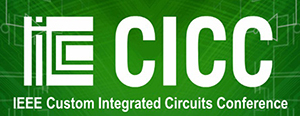Topics of Interest
CICC 2017 is soliciting increased participation in the following areas.
Papers in the following areas are requested.
Power Management circuits and techniques for power generation, conversion, distribution, monitoring and integration aimed to reduce overall energy consumption and increase power efficiency including adaptive techniques, IP/SOC/System level power and thermal management techniques, regulators, DC-DC converters, power control and management circuits , energy-harvesting and wireless power circuits.
Analog Circuits and Techniques for areas such as communications, biomedical, aerospace, automotive, energy, environment, computing and security applications, ranging from basic building blocks to silicon sensors, interfaces, and novel clock generation architectures.
Data Converters of all types enabled by new techniques, architectures, or circuit topologies.
Wireless Transceiver and RF Circuits for low-power and energy-efficient links, biomedical and wireless sensor networks and IoT applications, cellular connectivity including M2M applications (LTE-M, NB-IoT), emerging broadband and MIMO networks (5G, WLAN), millimeter-wave and THz systems (radar, sensing and imaging).
Wireline Communications Circuits and Systems for electrical and optical communications, including serial links and components for intra-chip and chip-to-chip interconnections, high-speed memory and graphics interfaces, backplanes, long-haul, and power line communications.
Design Foundations: modeling, simulation, manufacturing, and testing, to improve design quality and design efficiency. Topics include modeling of advanced CMOS (e.g., FinFET, FD-SOI) and beyond-CMOS devices (e.g., GaN, Non-Volatile Memories), design methodologies for emerging applications (deep learning, automobile, IoT, security), and design for manufacture, test, and reliability (novel DFT circuits, system-level testing, SoC verification).
Emerging Technologies solicits hardware focused papers in the technologies of tomorrow. This includes but is not limited to biomedical SOCs, sensors and MEMS, hardware based machine learning, emerging memories, silicon photonics, disruptive digital design, large area electronics, implementations in non-CMOS and hybrid process technologies.
